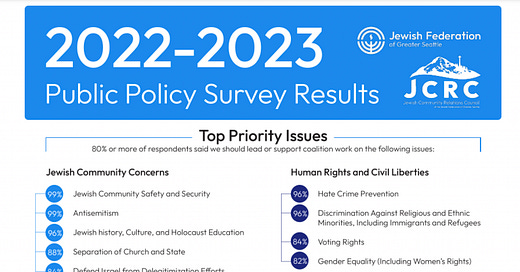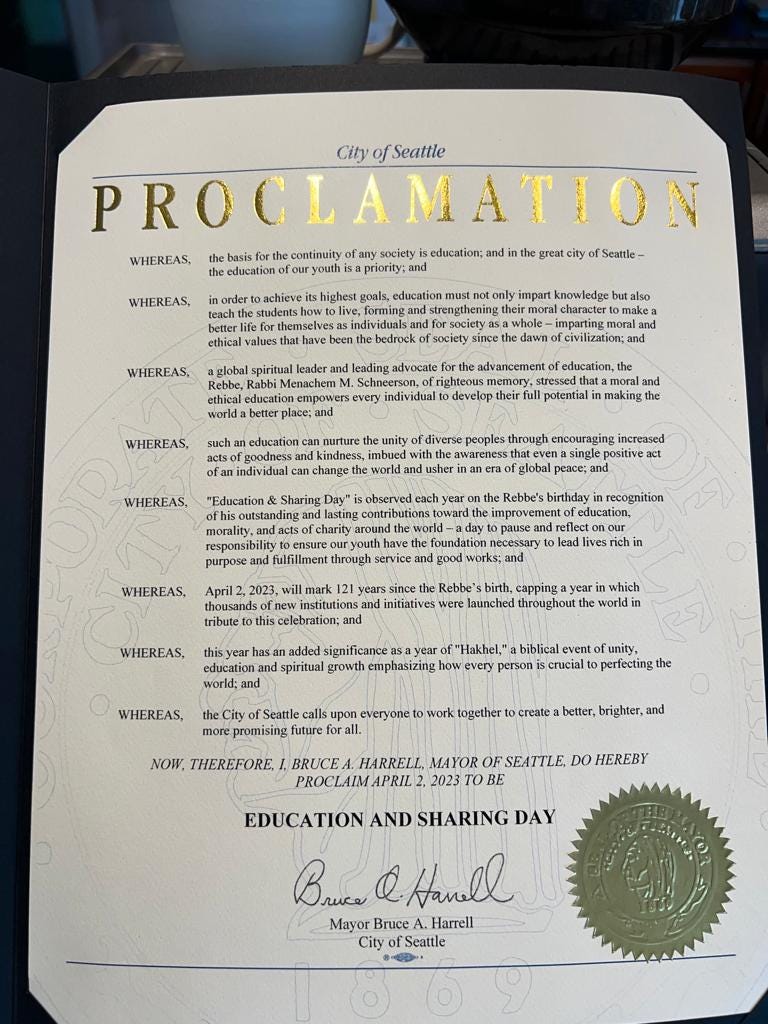How the Jewish Community's Legislative Priorities Played Out
Wins for Holocaust education funding, doxing civil penalties and gun reform
Rare Sunday edition! Apologies for the delay. The Cholent is still hot.
Starting off with an op-ed today. Anyone can submit letters and op-eds!
Finding Connection in a Digital World
By Rabbi Shmuel Levitin
Technological advance has succeeded in making the world a much smaller place. With the click of a button, we can connect with almost anyone, anywhere, and at any time. These capabilities have brought many conveniences and have radically simplified our lives. However, with all these benefits come drawbacks. Our pervasive digital connection has ironically caused many to feel isolated and alone.
This is especially true for our youth, who feel the social and emotional impacts of technology’s pervasiveness even more than adults. The dawn of social media has brought with it the pressure to constantly project an image, often one disconnected from reality. In my years of working with young professionals in the Seattle area, I’ve noticed that many cite the need to live up to unrealistic and superficial expectations as a factor which has contributed to widespread feelings of inadequacy and mental health issues among Millennials and Gen Z.
Now that we are living in post Covid time, what damage control can we do that will help combat these issues, particularly in our young people?
I believe that the ultimate way to live is to give. Giving to others removes some of the perfectionist pressure and allows one to connect with others who really need help. An anecdote that illustrates this is that there are two bodies of water in Israel. The first is the Sea of Galilee, teeming with life and the Dead Sea, hostile to living beings and devoid of all life. The difference is that the Galilee flows into a river, allowing all the water that it receives to flow out of it. Whereas the Dead Sea is the lowest place on earth, the end point of all the water that flows into it. The lesson here is: sharing will enliven you and allow you to be a receptacle for even more blessings. Selfishness on the other hand will confine you to yourself, stymieing those who seek to be a part of you.
The Rebbe, Rabbi Menachem Mendel Schneerson, the most influential modern Jewish leader, encouraged everyone, especially young people to consider what acts of kindness they could add in their daily life. From small acts like smiling to the checkout clerk or giving a dollar to charity, to big acts like inviting someone over to share a holiday meal or helping someone in the hospital are acts that make a person truly alive. By giving to others, you create space to allow positivity to enter and make the world at large a better place
On April 2, the Mayor of Seattle — along with the President Biden and public officials around the country — proclaimed Education and Sharing Day USA. This day celebrates the contributions that the Rebbe made to advancing the moral and ethical aspects of education. The Rebbe believed that education is more than transmitting facts or preparing children for a career. Beyond teaching skills like math, reading and writing, it is the educator’s role to instill within their students a sense of a greater purpose. This encourages acts of kindness and teaches each child that they have a vital role to play in this world.
This sense of connection and well-being can be further fostered by many of the observances and traditions that have been passed down to us. For instance, when Jews around the world gathered on Pesach for the seders with family and friends, that time-honored celebration gave us the freedom to disconnect from the world for one night, and connect with those around us and with our heritage rich in history and tradition. The Rebbe would often wish people at Passover that “the festival of our freedom bring you and yours true freedom. Freedom from anxiety — material and spiritual … and to carry over this freedom and joy into the whole year.” This is a blessing that is applicable any time we connect to our tradition, whether it’s by putting on tefillin, lighting Shabbat candles or sharing a Shabbat meal with friends and family.
During Sefirat Ha'Omer — the 49-day period between Passover and Shavuot — we prepare ourselves for the giving of the Torah by examining each night one of the 49 aspects of our soul. When Hashem gave us the Torah, he gave us a framework with which to make the world a more holy place. May we take that lesson and apply it to our own lives, that we should give more than we take, and not take for granted the blessings that we do have.
Rabbi Levitin is the Executive Director of Chabad Young Professionals Seattle & Chabad of Downtown Seattle.
How Did the Jewish Community’s Legislative Goals Shake Out?
Some big wins and, of course, more work for next year.
The 2023 Washington state legislative session has wrapped up, with wins for Jewish community legislative priorities as set by the Jewish Communal Relations Council and Jewish Federation of Greater Seattle based on community feedback. Victories include Holocaust education funding, security grants, and anti-doxing, as well as assault weapons restrictions and food security.
The JCRC and the Federation poll the community annually to assess priorities. As in years past, the results came in with heavy support for policies that protect the community, followed by immigration and social safety net issues.
“Issues around anti-Semitism and security take up the vast majority of our energy,” says JCRC director Max Patashnik. “That’s what we spend 80 percent of our time on.”
The JCRC and Federation coupled their support on a number of bills with Jewish Family Service, the ADL and the Holocaust Center for Humanity.
HB 1335, “Concerning the unauthorized publication of personal identifying information,” was championed by the ADL for its approach to doxing. The practice of exposing an individual’s identifying details with an intent to cause harm now incurs civil penalties.
“We are grateful to the Washington legislature for taking up key anti-hate policies during the 2023 Washington legislative session that will offer greater protections to the Jewish community and members of marginalized groups experiencing hate,” says Pacific Northwest ADL director Miri Cypers. Cypers says her organization is proud to have established a “broad coalition” to offer “key protections to victims of this growing form of online hate and harassment.”
Patashnik sites the BDS-led Mapping Project as an example of why this legislation is important. That website shows mostly Jewish organizations across Boston “in which institutional support for the colonization of Palestine is structurally tied to policing and systemic white supremacy here where we live, and to US imperialist projects in other countries.” According to the ADL, the exposure of Jewish institutions and individuals with a call to “disrupt” and “dismantle” them contains a thinly veiled threat.
Perhaps the greatest victories were three bills around gun reform, a cause the Federation has taken up since a man espousing anti-Semitic and anti-Zionist views shot six women at the Federation office in 2006, killing one. Federation volunteer Linda Clifton was in the room in Olympia when Gov. Jay Inslee signed HB 1240, SB 5078, and HB 1143, which restrict access to assault weapons, establish pathways to justice for gun violence victims, and require a permit to purchase firearms, respectively. “We’ve been survivors of gun violence as a community here in Seattle, and that made us an important spokesperson for these measures early on,” says Clifton.
It’s also been a priority for the Federation to support social safety nets, including funding for Temporary Assistance for Needy Families (TANF), which passed. This year they supported a new bill that seeks to correct the generational effect of discriminatory housing covenants in Seattle, which also passed.
“If you or your family were affected by covenants that prevented you from buying redlined housing, you can now apply for assistance in buying property,” Clifton says. “The bill came to our attention when I was down [in Olympia] with ADL on the hate crimes and the doxing bill, and we met with [my State Representative] Frank Chopp, who brought it up for our consideration. The JCRC Advocacy Committee staff decided to support it. Our Jewish community was impacted by redlining. Families in this Jewish community couldn’t buy property because of these covenants."
Another notable win this session was funding for Holocaust education, with $1.5 million for two years. “We are thrilled, absolutely thrilled,” says Holocaust Center for Humanity executive director Dee Simon. According to Simon, the funding had been inadvertently left off last year’s budget. It was just a matter of advocating to get it back in.
“The funding will mostly be used for outreach to expand our outreach in schools,” says Simon. “By the time the two years are over, we will hopefully reach 50 percent of the school districts in our state.”
Reaching school districts and training teachers is a big lift, she adds. But she sees promise. “There’s been a change in teachers being interested in Judaism,” she says. “Many of the students who are leaning into white supremacy, they don’t know anything about Judaism. We’ve had teacher trainings, Judaism 101, Jews in America, European anti-Semitism, and in the summer we will have a class on the Israel-Palestinian conflict. In many ways, Holocaust education is more than Holocaust education, and we are really proud to be doing this work now.”
The JCRC was also pleased to see $500,000 allotted for State Nonprofit Security Grants, which will go toward hardening institutions that are at high risk of terrorism. Past funding from the Department of Homeland Security has helped Jewish organizations boost security and train for emergency response.
Numerous bills died along the way, including a basic income pilot program, an attempt to halt hospital mergers, and a hate crimes and bias incident hotline. Local leaders, like Cypers, already have their sights set on 2024.
“We look forward to further work with our coalition partners to establish a statewide hate incident hotline in Washington state mirrored after Oregon,” she says. It “will be our top priority in the 2024 legislature, ensuring all victims of anti-Semitism and various forms of bias have the resources and services they need.”
Community Announcements
Check out the Seattle Jewish community calendar and the virtual calendar.
A Celebration 2023 Showcase by the WSJHS for June 15th at 7 pm – be there and be a part of history: wsjhs.org/roots.
Shoutouts
Mazal tov on the marriage of Samara Spitzer and Jay Linenkohl and on the engagement of Phil Spitzer and Aileen Thurm. —Rob Spitzer
Congratulations to the WSJHS for being awarded the Virginia Marie Folkins Award for outstanding publication for the second edition of Family of Strangers. The annual AKCHO Awards recognize individuals and organizations who have done incredible work in the last year to forward history and heritage in King County. Special thanks to new section author, Stuart Eskenazi and the original authors, Howard Droker, Jackie Williams and Molly Cone (z’l). —Lisa Kranseler




